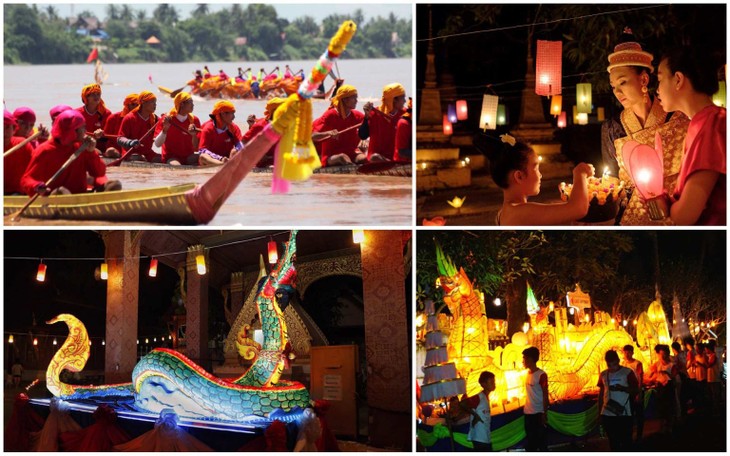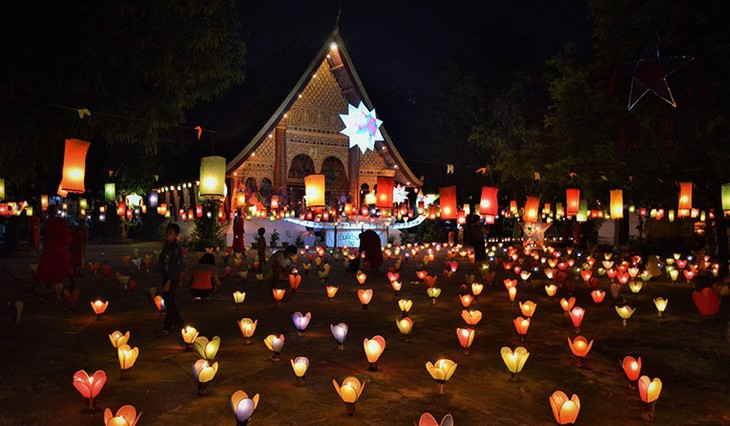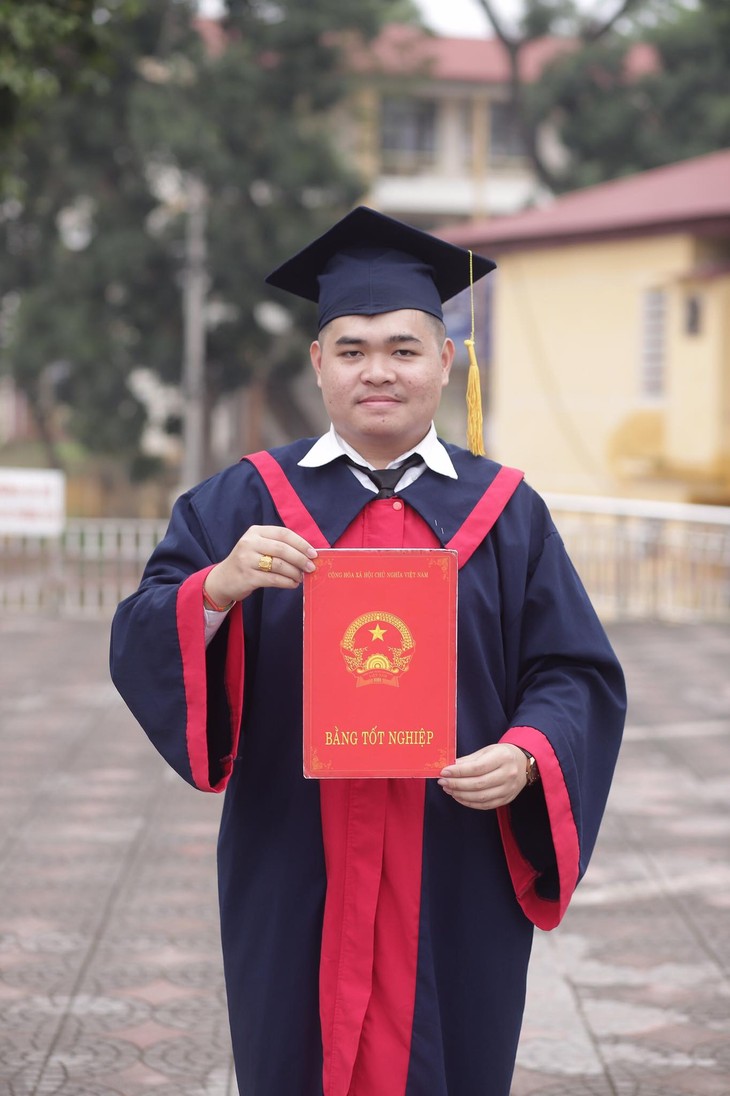(VOVWORLD) - Lao people celebrate scores of traditional festivals and holidays throughout the year. Most of them, including the Boun Ork Phansa Festival, are based on Buddhism and interwoven with the seasons and Laos’s agricultural lifestyle. Boun Ork Phansa marks the end of Buddhist Lent, a three-month retreat during the rainy season. In this week’s Cultural Rendezvous, Lao student Boualaphan Phonesavanh will tell us about this festival and what Lao young people think of it.
 There are many interesting activities during Boun Ork Phansa or the End of Buddhist Lent, such as candlelit procession, boat racing, or release of colorful floats to the Mekong River.(Photo: laostravel.com) There are many interesting activities during Boun Ork Phansa or the End of Buddhist Lent, such as candlelit procession, boat racing, or release of colorful floats to the Mekong River.(Photo: laostravel.com) |
Bao Tram: Welcome to VOV’s Cultural Rendezvous! Tell us about yourself.
Boualaphan: Hello, first thing up I would like to say hello to all VOV radio listeners. You are here with me, Phan, a Lao student from the Advanced Education Program at Thai Nguyen University of Agriculture and Forestry. It’s my pleasure to be here, and thank for having me here today.
Bao Tram: Well, our topic for our discussion today is the Boun Ork Phansa festival. So what is Boun Ork Phansa?
Boualaphan: In the Buddhist belief, Ork Phansa commemorates Buddha returning to earth from heaven after spending a three months retreat period in heaven, where he visited his mother. His return was greeted by his followers with gifts of food. Therefore, on this day we as Buddha’s followers celebrate his return.
 The Festival of Lights celebrates the end of Buddhist Lent. (Photo: goabroad.com) The Festival of Lights celebrates the end of Buddhist Lent. (Photo: goabroad.com)
|
Bao Tram: When is Boun Ork Phansa held?
Boualaphan: The Ork Phansa Festival takes place on the last day of the Buddhist Lent. It occurs in October, three months after Khao Phansa (beginning of Buddhist Lent), on the 15th day of the 11th month of the Lao lunar calendar.
Bao Tram: How do you celebrate this festival?
Boualaphan: In terms of religion, Lao Buddhists found that it is a great opportunity to go to temples to pray and make offerings with people who have the same belief, and we do believe that the donations and offerings we have made on this day will bring us a plethora of blessings and luck. And in terms of celebration, this is just a great chance to enjoy the fun events of a 3-day festival!
Bao Tram: Give us some highlights of the Boun Ork Phansa festival.
Boualaphan: On the full moon day, at dawn, donations and offerings are made at temples around the country. In the evening, candlelight processions are held around the temples and people’s houses, which are breathtaking to see. There are other activities that happen on this special day, as well. We have a celebration called Laiheuafaior Loi ka thong, where everyone sends small lighted ‘boats’ made of banana stems and leaves decorated with candles and flowers down the river to pay respect to the Buddha and to thank the mother of rivers for providing water for our lives. We believe that sending the lighted boats down the river can secure blessings and float the bad luck of the past year away, enabling good luck to flow in. Some people also believe this activity pays respect to the Nagas who live under the river. Speaking of Nagas, another celebration which is not to be missed is the Naga fireballs, a phenomenon peculiar to the Mekong region. A number of red fireballs are shot up from the river, which is believed to be the Nagas’ present to the Buddha as he returns to earth from heaven. One more important event for this day is the boat racing festival that fills the town with noise and a festive spirit as thousands of spectators cram the riverbanks and cheer for the racers. The streets are lined with food stalls, sideshows, and stalls selling all manner of clothing and other items.
Bao Tram: Talking about festivals, I can’t stop thinking about eating and drinking. Are there any traditional foods or beverages Laotians associate with Boun Ork Phansa?
Boualaphan: I’m trying to think if there are any, but, to be honest, I don’t think we have any specific food for this day. But there is one traditional dessert that people often make for special occasions like this – “khao tom” or “bananas with sticky rice”. It’s easily made by wrapping some banana and coconut sticky rice in a banana leaf and steaming it. Laotians often make this dessert to give as alms to the monks, but they like to eat it themselves at celebrations, as well. As for beverages, the only thing that comes to mind right now is beer.
 Boualaphan Phonesavanh is a fourth year student of Thai Nguyen University of Agriculture and Forestry, majoring in environmental science and management. Boualaphan Phonesavanh is a fourth year student of Thai Nguyen University of Agriculture and Forestry, majoring in environmental science and management. |
Bao Tram: What do you like most about Boun Ork Phansa?
Boualaphan: What I like the most about this festival is taking the time to enjoy every aspect of it. I force myself to wake up early in the morning to give alms to the monks, go with my grandmother to the temple to light candles and try to avoid the firecrackers, go to see the Naga fireballs, and have dinner on the riverbank. I still remember crying and begging my dad to take me to see the boat racing when I was a kid. Such unforgettable moments really make me feel in love with this special occasion.
Bao Tram: Here I have a long list of Laos’s colorful festivals. Wow, you have at least one festival to celebrate every month. So apart from the fabulous Boun Ork Phansa, what else should I explore if I ever visit Laos?
Boualaphan: I don’t have any special advice when you should visit, but if you’re a first-time visitor, remember to pay attention to what you wear. You should dress politely and conservatively, for example, to go inside any temple. If possible, women should wear a “sihn”, a traditional Lao skirt with a top that covers their shoulders. And you do have to respect any elder, monk, novice, or nun. In Laos, women are not allowed to touch them, so try to avoid getting too close to them. And what else? Ah, don’t touch anyone with your feet. If it happens by accident, you have to apologize to them immediately. Beyond that, just be prepared to explore our culture.
Bao Tram: Thank you, Boualaphan, for talking to us about Boun Ork Phansa, celebrating the end of Buddhist Lent.
Boualaphan: Thank you, VOV, for having me here today and thanks to your listeners. Bye, bye!